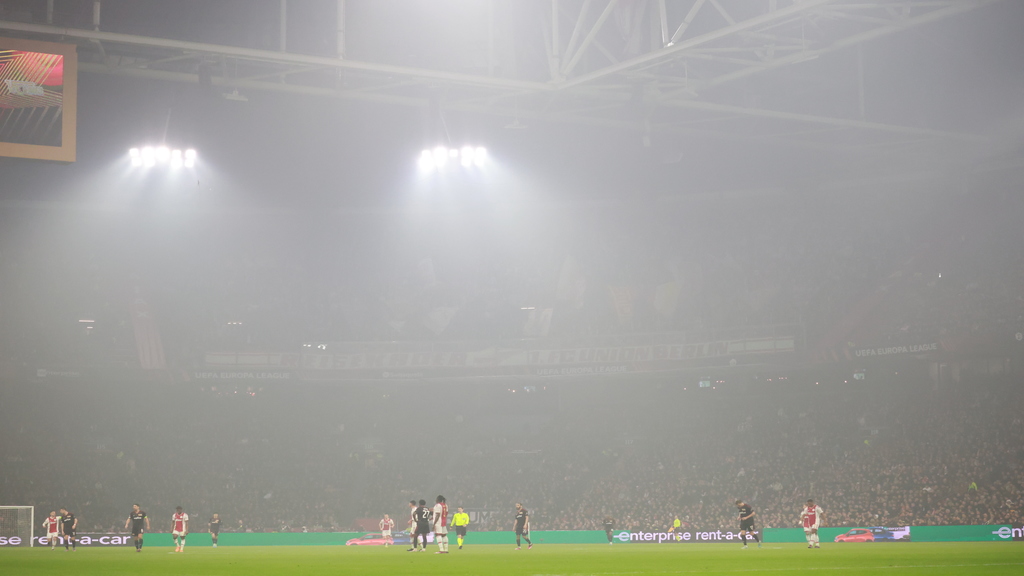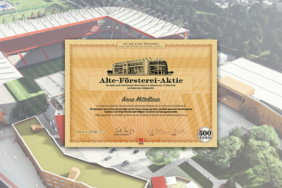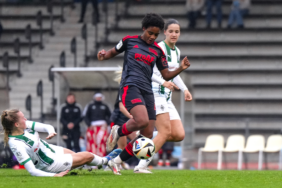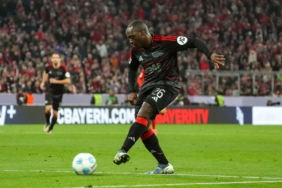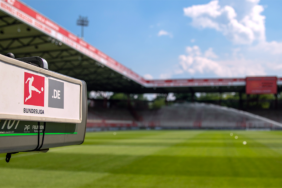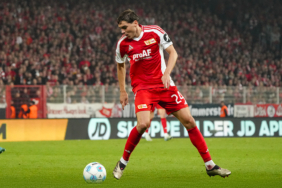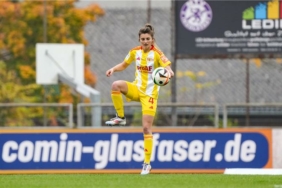The national monument, thrusting out of Amsterdam’s Dam square, was surrounded with Unioner by 2pm. They flocked around the place like pigeons in red, watched over by bored looking police in high-vis vests. Some had slept, others had not. Many were drunk, others were stoned, and still plenty more were just hanging out waiting for the game so this endless hanging around could finally come to an end.
A guy in a beautiful East-West, number 25 Daniel Teixeira shirt that has survived over 20 years of this sort of thing wandered out of a pretty, if unloved boozer that was shrouded in perpetual darkness even though the curtains were open and the lights were on. It cost 50 cents to use the toilet there, a cubicle the size of a shoebox that had half an inch of water on the floor. But woe betide the man who tried to use it without having bought a seven quid beer or paid the fee.
They’d been out in the city the night before, somehow still outnumbered by the English blokes posturing outside Irish pubs with their chests out like they were raising a posse together to chase the bad guys in black out of their town once and for all.
The Unioner loved Amsterdam, as their many sympathisers seemed to love them, such as the man on the bike singing Nina Hagen’s anthem to any that passed his way. But they were here with a purpose. They hadn’t come just for a jolly up, or to make up the numbers.
This was important; they had come here to help their team, to be a part of the system.
For even there at Dam Square the people all knew each other, groups multiplied and divided like cells under a microscope. It was just when they came together as one in the top corner of the gigantic Johan Cruyff Arena that they took shape, solidifying as one. Their voices rose up to the opened roof where the constant drizzle in the floodlights made it look like someone was brushing the dust off it. When their flares burned, they were in a line, maximising their significance, using the space they were provided to maximum effect.
Which is interesting in a way. Because they were to witness one of the most significant results in Union’s history – a 0-0 against Ajax in Amsterdam is most definitely this – and one that was also the triumph of a beautifully honed, perfectly grooved system. That Robin Knoche, Danilho Doekhi and Diogo Leite make up the best back-line currently playing football in Germany, despite having never played more than 20-odd games together, is because they are given the freedom to do so, knowing that each knows his place.
They know when to cover, and when to go.
This was supposed to be a Dutch thing. David Winner wrote in his masterpiece, “Brilliant Orange, the neurotic genius of Dutch football”, that the great Ajax sides – as immortalised on every wall of every floor of that enormous concrete organism with escalators for arteries and a wide, wide pitch at its heart – saw space in a different way to most of us. It has to do with the endless Dutch horizon, which he said gave Rinus Michels and Cruyff himself an appreciation of width and depth, drawn from people like Cornelis Lely carving half of the country out of the sea, with the invention of the steam engine and the desperate longing for expansion of the early trading capitalist evangelist.
He cites both Louis Van Gaal’s Champions League winning side and Schiphol airport as the natural consequences of these innovations. How the groundwork was set, and then all it needed was to be renewed with an adapted, intuitive system on top of it. This is very Dutch, he says.
Berlin does not have Schiphol, though. It has the catastrophe in Duplo that is BER. And instead of Lely, we had James Hobrecht.
Hobrecht got the job of city planner because his brother was the mayor. His tenements for the poor workers of Prenzlauerberg were too cold and unsanitary for not only the working classes of turn of the century, who starved in them, the citizens of the GDR who shunned them, or even the new gentrifiers who are now discovering they can’t put lifts in or get the mice out of the rooves of them.
However, it was not the Dutch side last night who looked like they had the best system. The Unioner looked down on the pitch from all that way away, and through the smoke that billowed around, they looked down upon a masterpiece.
Urs Fischer once said to Christoph Biermann in his own brilliant book about Union, “Wir werden ewig Leben” that, “You have to decide upon a system in which the players feel comfortable.” And here-in is the fundament of Union’s on-the-pitch success.
Fischer was a late adopter of having three (or five, depending on the lie of the land, the roll of the ball and the threat of the Gods) at the back. He played it first in a 1-0 loss to Wolfsburg in Union’s first season in the Bundesliga. But it had been on his mind already. According to Biermann, it was largely fortuitous opportunism at first
“In pre-season Fischer had sacrificed two games to try out a 5-3-2, but it didn’t work at first”, he wrote. “Then came the opportunity to try it again because Wolfsburg played in the same system. Union could mirror their opponents.”
Despite the loss, it had him thinking, and it was after the game against Hertha BSC – the one of the Sebastian Polter penalty – that he really settled upon it. He had Keven Schlotterbeck, Marvin Friedrich and Neven Subotic that day, but it was the addition of Christoph Lenz as the left sided wing-back, with Christopher Trimmel flourishing in the role on the right that allowed it to supercede everything else that had got them that far.
Ask James Brown. If the system is right enough, and the system is tight enough, then you can put any player you want into it as long as you put your faith in them, they believe they can do it, and they know why they are there. This partially explains why Union’s biggest sales have failed to flourish as they might elsewhere, and their acquisitions have done the opposite. This explains why Rani Khedira has blossomed into the dynamic, ball winner who snaps around that netherland between the D of the box and the halfway line like it is his master’s domain.
What it all meant was that consensus in the Arena, and on the streets of Amsterdam, was that it was remarkable, really, how unremarkable it all is; that Union could not only hold the mighty Ajax at bay, but that they could indeed create the better chances, they belonged.
On the way to Dam Square from PJH Cuypers’ glorious Centraal station were a couple of Unioner, walking through the crowds in white branded hoodies, printed up for the trip. One had a cotton bag over his shoulder, filled with stickers that he was sticking up the whole road long. He was systematic and deliberate; he found space for them to shine and chose eye lines to make them seen.
There is probably a message in that.

